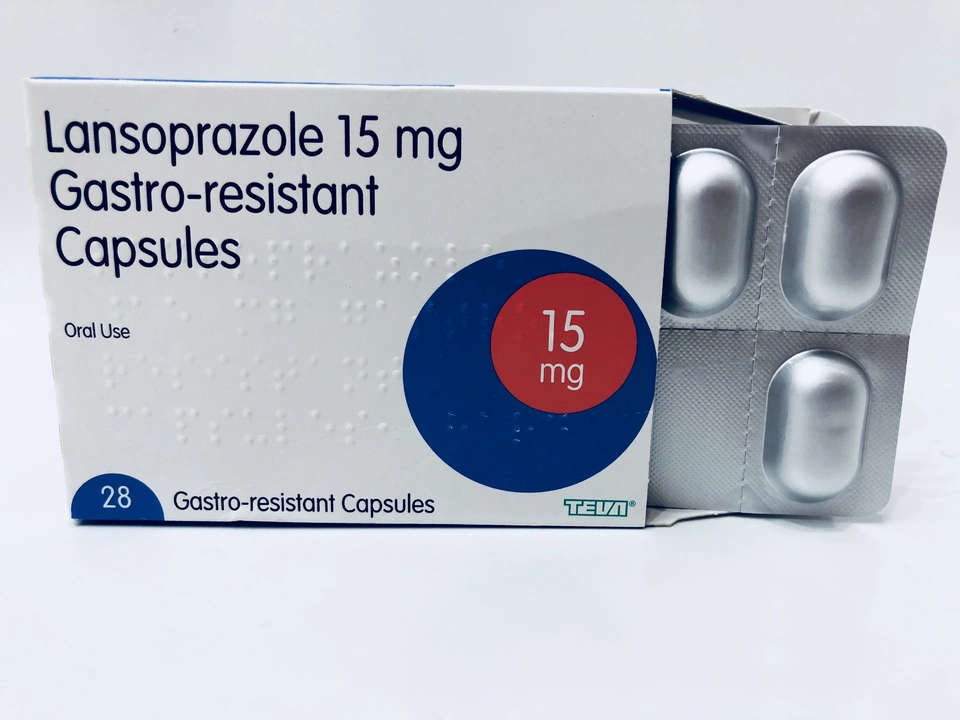Introduction to Dexlansoprazole and Lansoprazole
In the world of medications, it's not uncommon to come across drugs with similar names, but different actions and purposes. One such example is the case of Dexlansoprazole and Lansoprazole. Both belong to the same class of drugs called proton pump inhibitors (PPIs), but they have some key differences. In this article, we will dive deep into understanding these differences and help you make an informed decision when choosing between these medications.
How Dexlansoprazole and Lansoprazole Work in the Body
Dexlansoprazole and Lansoprazole are both proton pump inhibitors (PPIs) that work by reducing the amount of acid produced in the stomach. They do this by blocking the enzyme responsible for acid production, called the H+/K+ ATPase, which is also known as the proton pump. By inhibiting this enzyme, PPIs effectively decrease the secretion of gastric acid, providing relief from symptoms associated with heartburn, acid reflux, and other gastrointestinal conditions.
Although both drugs work through the same mechanism, there are some differences in their chemical structures. Dexlansoprazole is actually an enantiomer of Lansoprazole, meaning it is a mirror image of the Lansoprazole molecule. This structural difference results in a slightly different pharmacokinetic profile, which impacts how the drug is absorbed, distributed, metabolized, and eliminated from the body.
Comparing the Effectiveness of Dexlansoprazole and Lansoprazole
When it comes to the effectiveness of Dexlansoprazole and Lansoprazole, both drugs have been proven to be effective in treating gastrointestinal conditions related to excessive acid production, such as gastroesophageal reflux disease (GERD), peptic ulcer disease, and Zollinger-Ellison syndrome. However, some studies suggest that Dexlansoprazole may be more effective in providing sustained acid suppression over a 24-hour period compared to Lansoprazole.
This difference in effectiveness can be attributed to the pharmacokinetic properties of Dexlansoprazole. The drug is released in two stages, which leads to a prolonged duration of action and sustained acid suppression throughout the day. This dual-release mechanism may provide an advantage in terms of symptom relief and overall patient satisfaction, especially for those who require round-the-clock acid suppression.
Side Effects and Safety Profile of Dexlansoprazole and Lansoprazole
As with any medication, both Dexlansoprazole and Lansoprazole have potential side effects. Common side effects associated with these drugs include headache, diarrhea, nausea, abdominal pain, and gas. In most cases, these side effects are mild and do not require any medical intervention.
Although rare, serious side effects can occur with the use of PPIs, such as an increased risk of bone fractures, kidney problems, and Clostridium difficile-associated diarrhea. It's important to note that these risks are associated with long-term use of PPIs, and the overall safety profile of both Dexlansoprazole and Lansoprazole is considered to be similar. As always, it is crucial to discuss any concerns with your healthcare provider to determine the most appropriate treatment plan for your specific needs.
Choosing the Right Medication for Your Needs
Ultimately, the decision between Dexlansoprazole and Lansoprazole will depend on your individual needs and the recommendation of your healthcare provider. Both medications are effective in treating gastrointestinal conditions related to acid production, but Dexlansoprazole may offer an advantage in terms of sustained acid suppression throughout the day. It's important to consider factors such as the severity of your symptoms, your medical history, and any potential drug interactions when choosing the right medication for you.
Always consult with your healthcare provider before starting any new medication, and be sure to discuss any concerns or questions you may have. By understanding the differences between Dexlansoprazole and Lansoprazole, you can make a more informed decision and find the best treatment option for your needs.





16 Comments
Jelisa Cameron- Humphrey-16 May 2023
Dexlansoprazole's dual-release pharmacokinetic profile is a clinically significant advancement in PPI therapeutics. The enantiomeric purity allows for more consistent plasma concentration curves, reducing interpatient variability in acid suppression. This is particularly relevant in GERD patients with nocturnal breakthrough symptoms where conventional PPIs like lansoprazole demonstrate suboptimal coverage beyond 16 hours.
Pharmacogenomic considerations also come into play-CYP2C19 poor metabolizers may experience amplified efficacy with dexlansoprazole due to reduced first-pass metabolism. This isn't trivial; it directly impacts dosing stratification in precision medicine frameworks.
Long-term safety data remains comparable, but the extended duration of action may reduce pill burden and improve adherence, which is a major confounder in real-world effectiveness studies.
Lee Lach-17 May 2023
Let me be clear: the FDA approved dexlansoprazole not because it's better, but because Takeda paid for the right studies. The so-called 'dual-release' is just a gimmick to extend the patent. Lansoprazole has been around for decades with real-world data. Dexlansoprazole's 'superior' 24-hour suppression? That's from industry-funded trials with cherry-picked endpoints. They're selling you a placebo with a fancy label.
And don't get me started on the 'sustained acid suppression' myth. Your stomach needs acid. Suppressing it 24/7 for years leads to bacterial overgrowth, nutrient malabsorption, and osteoporosis. The pharmaceutical industry doesn't care-they profit from your dependency. Wake up.
Tracy McKee-18 May 2023
Dexlansoprazole is just lansoprazole but with a fancy name and higher price tag dont let them fool you
Abigail M. Bautista-18 May 2023
I tried both. Dexlansoprazole felt like it lasted longer but honestly I couldnt tell the difference. Too expensive for no reason
Rohan Puri-19 May 2023
Why are you even comparing these two its just marketing bullshit. In India we use generic omeprazole and its fine
Mandeep Singh-20 May 2023
American pharma companies think they invented medicine. We have better traditional remedies in India. These pills are just poison wrapped in science.
Chris Bellante-21 May 2023
What's fascinating is how dexlansoprazole's R-enantiomer exploits chiral pharmacokinetics to delay gastric emptying effects. The delayed-release formulation isn't just a gimmick-it's a pharmacodynamic hack that decouples peak plasma concentration from gastric acid rebound.
That said, the real elephant in the room is cost-effectiveness. For most patients, lansoprazole still delivers 90% of the benefit at 30% of the price. Unless you're a refractory GERD patient with nocturnal symptoms, you're paying for marginal gains.
And yes, the FDA's approval was based on non-inferiority trials. Not superiority. Don't let the ads fool you.
Nicole Manlapaz-22 May 2023
Hey everyone! Just wanted to say if you're struggling with acid reflux, don't stress too much about which PPI you take-talk to your doc first! 🌱
I switched from lansoprazole to dexlansoprazole last year because I kept waking up with heartburn. Honestly? It made a difference for me. No more midnight burning 😌
But if you're doing fine on lansoprazole? Stick with it. No need to upgrade unless you need it. Your body knows what it likes 💪
Also-don't forget lifestyle stuff! No late meals, no spicy food, elevate your head. Meds help, but habits heal.
Frederick Staal-22 May 2023
It's not about efficacy. It's about control. The pharmaceutical-industrial complex doesn't want you to heal. It wants you dependent. Dexlansoprazole was engineered to create chronic use. The 'dual-release' is a Trojan horse.
Every time you take a PPI, you're not just suppressing acid-you're disabling your body's natural defense mechanism. The gut microbiome collapses. Calcium absorption plummets. The risk of pneumonia rises.
And yet, we're told this is 'safe.' Safe for whom? For the shareholders. Not for you.
They'll sell you another pill. Then another. Then another. And you'll keep paying. Because they've convinced you that your body can't heal itself.
Wake up.
erin orina-23 May 2023
So happy I found this post! 😊 I was totally confused between these two.
I went with dexlansoprazole after my GI doc said my acid was bouncing back at night-made a huge difference! 🙌
Also, if you're on PPIs long-term, please get your B12 and magnesium checked. I didn't know I was deficient until I got tested. 🩺💡
You got this! 💕
Lisa Uhlyarik-24 May 2023
People dont even know what theyre taking anymore. Just swallow whatever the doctor gives you. You think you're smart but you're just a sheep. Dexlansoprazole is just a rebrand. Same stuff. More money for Big Pharma
Kelley Akers-26 May 2023
How quaint. Americans spend $10 billion annually on PPIs while ignoring the root causes: poor diet, chronic stress, and sedentary lifestyles. Dexlansoprazole isn't medicine-it's a Band-Aid on a severed artery.
The fact that we normalize lifelong acid suppression as 'treatment' speaks volumes about our medical system's failure to address lifestyle medicine.
And yet, here we are, debating enantiomers while our collective gut health crumbles.
Classy.
Cameron Perry-26 May 2023
Wait so dexlansoprazole is just the R-isomer of lansoprazole? That's wild. So it's not a totally new drug, just a purified version? That makes sense why the side effects are similar. I wonder if the cost difference is worth it for most people
JOANNA WHITE-28 May 2023
Been on lansoprazole for 5 years. Switched to dexlansoprazole last year after my doctor said I might benefit from longer coverage. Honestly? I didn't notice much. My symptoms were already under control.
But I did notice the price jump. Like, 3x more. Not worth it for me.
Also-side note: if you're on PPIs long-term, get your bone density checked. I did. Turns out I needed calcium + D3. Just a heads up 💡
TL;DR: Same job, different packaging. Talk to your doc, not the ads.
Peggy Cai-29 May 2023
People are so gullible. You think this is science? Its just corporate profit dressed up in lab coats. Lansoprazole works fine. You dont need the expensive version. You just need to stop believing everything you read
Jelisa Cameron- Humphrey-31 May 2023
Interesting take from the conspiracy theorist, but let's not conflate patent strategy with clinical irrelevance. The dual-release mechanism is empirically validated in multiple RCTs, including a 2018 meta-analysis in Gastroenterology showing a 22% reduction in nocturnal acid breakthrough with dexlansoprazole vs lansoprazole.
Yes, the patent extension was strategic. But the clinical benefit isn't imaginary. The same could be said for extended-release metformin or delayed-release budesonide-both are legitimate advances.
And yes, long-term PPI use carries risks. But those risks are dose- and duration-dependent, not formulation-dependent. Discontinuing PPIs without tapering can cause rebound hypersecretion-another documented phenomenon.
Blaming pharma ignores the fact that many patients genuinely benefit from optimized therapy. Not every innovation is a scam.